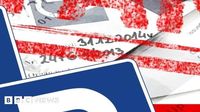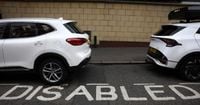Fraud investigators across the United Kingdom are sounding the alarm over a surge in the misuse, theft, and forgery of Blue Badges—parking permits designed to make life easier for disabled drivers. With an estimated 700,000 people already penalized for Blue Badge misuse between 2022 and 2024, authorities warn that the scale of the problem is growing, and the consequences for genuine badge holders are becoming increasingly severe.
Paul Slowey, who heads the Blue Badge Fraud Investigation (BBFI) agency, describes the current situation as unprecedented. "I'm confiscating more fake badges than ever before," Slowey told the BBC, adding that the Blue Badge system is being "thoroughly abused" by people seeking free parking without entitlement. The BBFI, a Hampshire-based community interest company, works closely with local councils to check that drivers are using Blue Badges correctly—and the number of confiscated fakes is climbing rapidly.
The Blue Badge scheme is a vital lifeline for disabled people, granting access to specially adapted parking bays and allowing holders to park for free in on-street pay-and-display bays, as well as for up to three hours on yellow lines (except where loading restrictions apply). Holders are also exempt from the £15 daily London Congestion Charge, a significant saving for those who need to travel into the capital. But this value has made Blue Badges a target for thieves and fraudsters—on-street parking in parts of southeast England can cost as much as £5.90 per hour, and fake or stolen badges are being sold online for hundreds of pounds.
According to fraud investigators, the methods of misuse are varied and increasingly brazen. People are found using badges belonging to family members without the badge holder present, and even badges of deceased relatives—a practice that is illegal. Mark Jobling, an investigations officer with East Sussex County Council’s Blue Badge team, reports that one in five badges is being misused. "We mostly deal with family members using the badge without the badge holder present, but we've also seen cases of people using a deceased relative's badge," Jobling said.
For legitimate badge holders, these abuses have real-world consequences. Steve Swyer, a Surrey resident who has multiple sclerosis and uses a wheelchair, said he often finds disabled bays occupied by vehicles without a Blue Badge displayed. "It used to make me quite angry but I've got so used to it now. It's just become a part of normal life for me—to pull up and realise you can't get where you need to go," Swyer told the BBC. "If I didn't have the car I'd spend probably 90% of my time indoors, literally not seeing anybody or going anywhere." Swyer also worries about theft: "You're advertising something that's very valuable—it makes you a target."
Erika North, a Kent resident who also has multiple sclerosis and works for BBC Children in Need, echoed these concerns. She explained that disabled bays near her home are so in demand that "often by 10am the few areas that have disabled bays are already full up." North emphasized that her Blue Badge is essential to maintaining her independence: "My Blue Badge enables me to carry on as I normally should be able to do for as long as possible. It's not some sort of perk."
The impact of Blue Badge fraud is not just about inconvenience; it can mean the difference between being able to attend work, shop, or access medical appointments—or being trapped at home. Rhydian Jones, a motoring expert at Confused.com, noted, "If you’re using a blue badge space without needing one, even for just a few minutes, you could be stopping someone from being able to work, shop, or attend a medical appointment." According to research by Confused.com, 36% of Blue Badge holders have arrived to find someone without a Blue Badge parked in an accessible space, while 34% say there simply aren’t enough accessible spots in their area.
To combat the rising tide of abuse, the UK government has strengthened enforcement powers. Plain clothes officers can now inspect and confiscate misused Blue Badges, and local authorities have been given the ability to cancel stolen badges. A Department for Transport spokesperson said, "Exploitation of the Blue Badge scheme is completely unacceptable—it is a vital resource helping many people travel with confidence." The Department says it is "supporting the police to tackle this issue by working closely with local authorities." A new crackdown scheme was launched in Brighton and Hove in December 2024, aiming to deter misuse and increase prosecutions.
Despite these efforts, enforcement remains a challenge. The Local Government Association points out that councils face "competing priorities" when allocating limited resources to tackle Blue Badge fraud. Disabled Motoring UK, a charity advocating for disabled drivers, is calling for more resources to be made available to local authorities for enforcement. "People don't think about the impact of having a fake one on people who are disabled and really need them and they are a lifeline," said Nikki Roberts, CEO of the Surrey Coalition of Disabled People. She mentioned that some members have resorted to fitting locks on their steering wheels to deter thieves from stealing their badges.
The scale of the problem is staggering. Between 2022 and 2024, a whopping 705,310 penalty charge notices (PCNs) were issued for Blue Badge misuse, according to Confused.com. The offences range from parking in a disabled bay without a valid badge—which can result in a fine—to more serious fraud, such as using someone else’s badge, which is punishable by an unlimited fine or up to two years in prison.
As the government investigates long-term solutions to prevent misuse, technology is playing a role in supporting legitimate badge holders. Confused.com has introduced a lookup tool to help Blue Badge holders find designated parking bays in their local area, aiming to make it easier for those entitled to the permits to access the spaces they need.
Yet, for many, the frustration persists. The daily reality of searching in vain for a suitable parking spot—or fearing the theft of a vital badge—has become all too familiar. As Nikki Roberts put it, "We do have members that have locks that go on to steering wheels in the car to kind of deter people from stealing the blue badge." The need for stricter enforcement, better public awareness, and more accessible parking spaces is clear to those affected.
With the government’s new enforcement measures and increased public scrutiny, there is hope that the tide may turn against Blue Badge fraud. But for now, the struggle for fair and accessible parking continues for thousands of disabled drivers across the UK.





